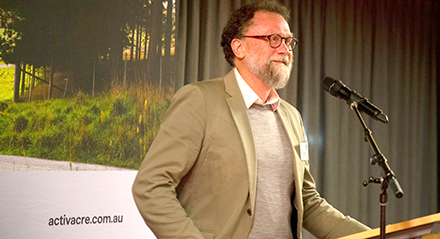A program like ActivAcre that unites the timber industry and farming communities is needed, says Professor Rod Keenan. The ActivAcre Program launched in Tasmania last week, incentivising farmers in Northern Tasmania to grow trees on their land in return for a reliable, annual income. Source: Timberbiz
The Program is owned by real asset investment company New Forests and managed by independent natural asset management service SFM.
Professor Keenan, Chair of Forest and Ecosystem Science at The University of Melbourne, has worked as a research scientist and science advisor in numerous Australian states and with the Australian Government as an advisor on forests and climate change. His research has taken him across Australia, Canada, Papua New Guinea and South-East Asia.
Professor Keenan recently led the Next Generation Plantation Investment Research Project, which explored options for increasing trees in rural landscapes.
“We need more trees in the landscape, and these landscapes where we want to plant them are largely owned by farmers,” he says.
“If they’re (trees) designed and configured in the right way, they can provide benefits on-farm as well as to the broader society with things like carbon, timber supply and positive environmental outcomes.”
Professor Keenan believes the ActivAcre Program has the right components for the industry to restore trust with Australian farmers by offering them a long-term partnership, backed by a robust investor. He says that farmers who have participated in previous tree-planting programs had often not had a positive experience.
“I think it (ActivAcre) is built around a model of genuine partnership and creating a long-term relationship between New Forests and the farmer,” he says.
“Compared with many other programs there is a clear market for the trees.
“By working in active partnership with farmers, the project manager can build the long-term relationships needed to make this investment model successful.
“I also see in New Forests the flexibility to incorporate some of the other things that the farmers might need, like biodiversity, planting in riparian areas and around farm dams to improve water quality.”
Professor Keenan welcomed the site-specific nature of ActivAcre, which takes into consideration the variation in farming practices and site conditions across landscapes.
“Each farm is going to be different in terms of its topography and each landowner, each farmer, is going to be different in terms of their needs,” he says.
“That’s why the arrangement of trees needs to be site-specific, designed in collaboration with the farmer to determine which trees might be planted and where they’ll go.”
For more information, visit www.activacre.com.au






